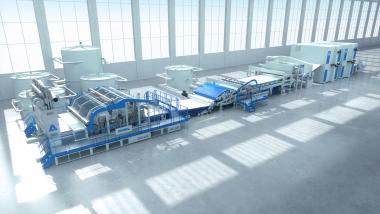IHKIB: Green Transformation Journey of the Turkish Apparel Industry
The fashion industry, which has strategic importance for the Turkish economy with its value-added production, employment, and exports, came together with representatives of global brands and Laison offices at the 'Green transformation' summit. At the meeting hosted by the Istanbul Apparel Exporters' Association (IHKIB), the studies carried out in the process of adaptation to the Green Deal were put under the spotlight, and the expectations of the Turkish fashion industry from the stakeholders were also expressed.
The opening of the meeting, attended by representatives of relevant ministries and foreign representations, national and international fund providers, as well as brands and buying groups were brought together, was made by Türkiye Exporters Assembly (TIM) and IHKIB President Mustafa Gültepe. In his speech, Gültepe underlined Türkiye's importance in the global apparel industry, by realizing approximately 3.5 percent of world apparel exports. Gültepe continued as follows:
"As IHKIB, we aim to increase our current annual exports, which are around $20 billion, to $40 billion. The road to the goal goes through Europe and America because the European Union is our largest market in apparel. We export 60 percent of our total apparel exports to EU countries. When we add other European countries and the USA, the ratio approaches 75 percent. While working on alternatives for the $40 billion in exports, we need to focus more on the European and U.S. markets because, as the data shows, the path to $40 billion in apparel exports goes through Europe and the U.S. We already have long-standing collaborations with brands centered in Europe and America. With our knowledge, speed, production quality, design power, and geographical proximity to Europe, we distinguish ourselves from competitors. We took a very important step in the transformation process exactly one year ago. We shared our action plan, which is a road map for our fashion industry's compliance with the Green Deal, with the public on January 30, 2023."
After Mustafa Gültepe's opening speech, Euratex Director General Dirk Vantyghem, Deputy Director General of the Ministry of Trade Bahar Güçlü, and Deputy Secretary General of ITKIB Özlem Güneş made presentations regarding the ongoing efforts in the Green Deal process.
Dirk Vantyghem discussed the sustainability strategy of the textile and apparel industry and the expectations from the EU administration, while Bahar Güçlü provided information about the reflections of legal regulations related to the Green Deal on Türkiye.
Deputy Secretary General of ITKIB Özlem Güneş emphasized the significant opportunity that the Green Deal represents for the Turkish apparel industry, providing comprehensive insights into the efforts conducted by IHKIB regarding the Green Deal adaptation process.
Istanbul Apparel Exporters' Association (IHKIB)





















